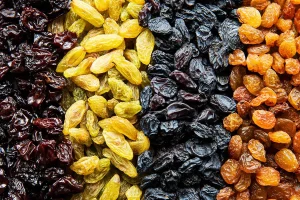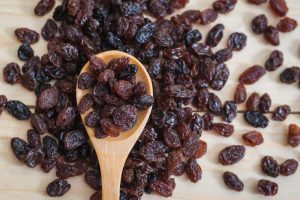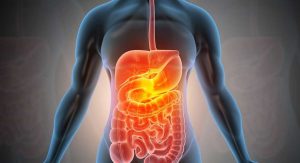
RAISINS BENEFITS
Raisins benefits. These are called Dried grapes. Because the grapes’ sugars and nutrients are concentrated throughout the drying process, raisins are high in calories and nutrients. Before arriving in Europe, where they were particularly well-liked by the Greeks and Romans, raisins were first introduced from the Middle East. In the past, raisins have been used as money, as prizes in athletic competitions, and as a remedy for illnesses like food poisoning.
RAISINS BENEFITS
Distinct grape varieties or drying techniques may result in distinct names for raisins. Three types of dried grapes include currants, sultanas, and raisins. Despite their many similarities, each has special qualities of its own.
1. improved cardiac health

By lowering blood pressure and blood sugar, raisins may help reduce your risk of heart disease, according to research. By lowering LDL (bad) cholesterol, the fiber in raisins eases the strain on your heart. Raisins are a good potassium source as well. Research indicates that low potassium levels are linked to heart disease, stroke, and high blood pressure. A high sodium intake, which is typical in many people’s diets, raises the amount of potassium your body requires. You can make sure you’re getting enough potassium by eating raisins, which are a low-sodium food.
2. Reduced chance of developing chronic illnesses

Compared to many other dried fruits, raisins have more antioxidants. This is because these antioxidants are concentrated throughout the drying process. Antioxidants aid in preventing cell damage brought on by aging and lifestyle choices. Phytonutrients are some of the more potent antioxidants found in raisins. It has been demonstrated that these plant-based substances lower the risk of developing long-term illnesses like diabetes, osteoporosis, and cancer. Phytonutrients may also reduce inflammation, alleviate pain, and safeguard your brain, according to research.
3. Improved digestive health

Raisins include soluble fiber, which helps with digestion and lessens gastrointestinal problems. Tartaric acid is also found in raisins. According to research, this substance may improve intestinal function, reduce inflammation, and maintain a healthy balance of gut flora. According to one study, it might also lower the risk of colorectal cancer.
4. Improved dental health
Oleanolic and linoleic acid, two minerals found in raisins, may have antimicrobial properties. According to studies, this impact might reduce the amount of germs in your mouth that cause plaque. Additionally, these antioxidants support the maintenance of normal dental pH levels. This can help prevent cavities by preventing your saliva from being overly acidic. According to research, raisins don’t usually adhere to your teeth, despite their reputation for being sticky. Eating sticky foods can increase your risk of cavities.
5. Reduced chance of anemia

Consuming raisins may reduce the risk of iron-deficiency anemia, a disorder in which the body is unable to produce enough healthy red blood cells, according to some animal research. Raisins are a good source of iron. You may feel weak and exhausted if you have anemia.
Side effects
Unwanted increase in weight

According to some research, eating raisins can make you feel full, which may help you shed or control your weight. However, each serving has a comparatively high calorie count. Therefore, if you wish to prevent weight gain, watch how much you eat.
discomfort in the stomach

Also, Fiber is healthy. However, excessive fiber intake, regardless of the source, can result in gastrointestinal problems like cramps, bloating, and gas. Additionally, some patients with irritable bowel syndrome may have gassiness after eating certain foods, such as raisins.
Summary
However, if you don’t consume too many raisins, they can be a nutritious snack. Although these dried fruits are particularly rich in vitamins and antioxidants, you should be aware of their high calorie and sugar content.